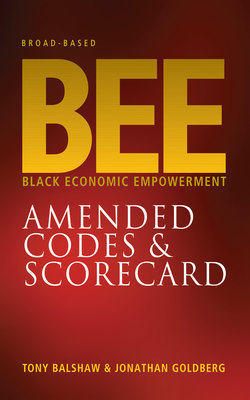Читать книгу Broad-Based BEE - Jonathan Goldberg - Страница 19
На сайте Литреса книга снята с продажи.
Generic Scorecard Points
ОглавлениеSome people would argue that broad-based BEE is seeking to extract uncompensated value from others through economic discrimination and evolving crony capitalism in an environment of economic discrimination. This argument will be even stronger, by some, under the new Codes of Good Practice with the emphasis back on ownership.
Value destruction occurs where redistribution takes place other than through economic growth. This issue remains the subject of on-going debate within the ruling political party, and will continue to be analysed throughout the implementation of broad-based BEE. In future, a good measure of economic growth will be attributable to the advancement in black individuals’ net asset value (including equity), notwithstanding that such capital may be encumbered to borrow funds to grow further.
The new Codes of Good Practice attempt to encourage this approach through phased implementation of certain Scorecard targets over a period. The ten year period, envisaged in the 2007 Codes, was not reached. In October 2013 a complete new set of Codes of Good Practice were released with a 12 month transitional period which has been further extended to 30 April 2015. Many say Government should have waited for the ten year period to lapse (2017) before changing the course of the broad-based BEE landscape. Government is under pressure from voters to ensure that the country transforms. They have taken the view that the way to do so is to place greater emphasis on black ownership, supplier and enterprise development.
Rather than working towards economic growth, people have been prone to bask in the glory of the political miracle – which cannot be sustained without a vibrant economy that will benefit the majority of the population.
The image of Nelson Mandela lifting the Rugby 1995 World Cup trophy in a Springbok jersey is deeply etched in the minds of many South Africans. It had a remarkable impact on people, capturing the essence of the political transition that had taken place. Nelson Mandela’s leadership approach has helped to fuel transformation: the great leader showed how to forgive and move forward. With the death of this great leader all South Africans need to continue to uphold this legacy.
Many South Africans involved in the current empowerment deals are able to relate to the emotional impact this moment had on their sense of destiny. Nevertheless, it is important to question whether the vast majority of South African citizens can relate to this today. Even if they can, does it bring a sense of things having changed for the better since then? Statistics indicate that, from an economic transformation perspective, we have not progressed very much since 1994. Given our country’s history, particular circumstances, convergence of interest-based dreams, goals and unity of purpose, pressure will continue to be exerted business to step up to the plate and support the government’s broad-based BEE agenda.
The problem is business alone cannot achieve these goals. There is a lack of partnership between business and Government and this is reflected in the implementation of the Amended Codes of Good Practice. These Amended Codes were not sufficiently consulted with business. Transformation cannot be achieved without business commitment and support. The unintended consequences of these Codes could very well be that business decides not to participate in the narrow BEE approach.
In a session with primarily white business leaders, Cyril Ramaphosa was asked to give his view of transformation in the context of the future government legislation and other measures to propel transformation. His reply was that transformation should start with each person asking themselves what they personally could do to bring about economic transformation in a radically racial and economically polarised society. A suggestion he gave was of a domestic worker in an average South African household. “Why not try to empower the person by giving them the opportunity to develop driving skills?” In this way the domestic worker could, for example, carry some of the “workload” by picking up the children and transporting them to and from school and extra-mural activities, and have the potential to move on to a better and higher-paying job. Ramaphosa’s contention was that if people are not personally committed to empowerment at a micro- (household) level, how would they implement empowerment in more complex business environments and across all spheres of the economy?
“Growth will put asunder all the false alliances we are so careful to protect. It will set people free and strengthen democracy as people reap benefits they will never want to lose . . . we are becoming a normal country, perhaps much faster than anyone believes possible.” – Peter Bruce, journalist and editor
